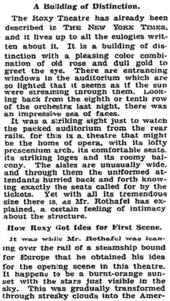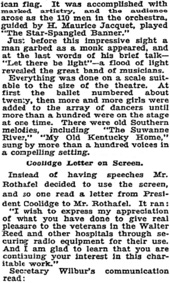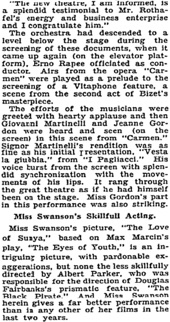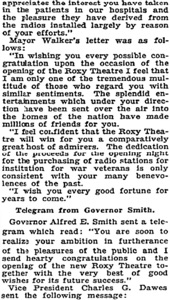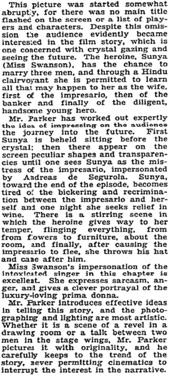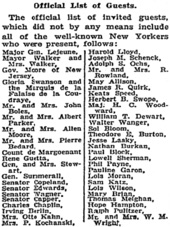The Circus 1927 1928 1929 next previous
The Circus Clippings 126/376
Mordaunt Hall, New York Times, New York, March 12, 1927.
Mr. Mordaunt Hall, motion picture editor of the New York Times
(...) Exhibitors Trade Review, Aug. 8, 1925, detail
„That‘s Charlie Chaplin“
Editorial content. „NEW ROXY THEATRE
HAS GALA OPENING
Its 6,200 Seats Filled, While Throng in Streets Tries
In Vain to Get In,
NOTABLES IN THE AUDIENCE
Good Wishes From Coolidge,
Smith and Walker Are Flashed on Screen
By MORDAUNT HALL.
The new Roxy Theatre, at Seventh Avenue and Fiftieth
Street, which was opened last night amid a blaze
of lights, is another monument to those story-telling shadows
that started less than thirty years ago in dingy stores
with tip-pan pianos and borrowed chairs. This new addition
to New York‘s great chain of entertainment houses
seats 6,200 persons and was erected at a cost of said to
have been close to $10,000,000. Less than eighteen
months ago on the site where this majestic building now stands
were the old car barns. It is a fulfillment of the cherished
ambition of S. L. Rothafel, better known as ,Roxy,‘ whose first
job in New York was that of a cash boy in a Fourteenth
Street department store.
Long before the hour set for the formal opening of the
Roxy‘s doors an imposing throng gathered. They
were eager to see Gloria Swanson, Charlie Chaplin, Harold
Lloyd and other notables who were expected to be
present. And judging by the many distinguished persons
one noticed in the grand rotunda, everybody who
was able to come was there. Miss Swanson, whose production,
The Love of Sunya, had the distinction of being the first
presentation in this new theatre, arrived about 8:30, and she
would have been carried off her feet had not several
men gathered around her and escorted her to her seat in one
of the orchestra rows.
Other screen celebrities had similar experiences,
and it was not the people on the sidewalk who
forged around them but those who had gained admission
to the building.
A Building of Distinction.
The Roxy Theatre has already been described in The
New York Times, and it lives up to all the eulogies
written about it. It is a building of distinction with a pleasing
color combination of old rose and dull gold to greet
the eye. There are entrancing windows in the auditorium
which are so lighted that it seems as if the sun were
streaming through them. Looking back from the eighth or tenth
row of the orchestra last night, there was an impressive
sea of faces.
It was a striking sight just to watch the packed auditorium
from the rear rails, for this is a theatre that might be the
home of opera, with its lofty proscenium arch, its comfortable
seats, its striking loges and its roomy balcony. The
aisles were unusually wide, and through them the uniformed
attendants hurried back and forth knowing exactly
the seats called for by the tickets. Yet with all its tremendous
size the is, as Mr. Rothafel has explained, a certain
feeling of intimacy about the structure.
How Roxy Got Idea for First Scene.
It was while Mr. Rothafel was leaning over the rail of a
steamship bound for Europe that he obtained his
idea for the opening scene in this theatre. It happens to be
a burnt-orange sunset with the stars just visible in
the sky. This was gradually transformed through streaky
clouds into the American flag. It was accomplished
with marked artistry, and the audience arose as the 110 men
in the orchestra, guided by H. Maurice Jacquet,
played ,The Star-Spangled Banner.‘
Just before this impressive sight a man garbed as a monk
appeared, and at the last words of his brief talk –
,Let there be light‘ – a flood of light revealed the great band
of musicians.
Everything was done was done on a scale suitable to the
size of the theatre. At first the ballet numbered about
twenty, then more and more girls were added to the array
of dancers until more than a hundred were on the
stage at one time. There were old Southern melodies,
including ,The Suwanne River,‘ ,My Old Kentucky
Home,‘ sung by more than a hundred voices in a compelling
setting.
Coolidge Letter on Screen
Instead of having speeches Mr. Rothafel decided
to use the screen, and so one read a letter from President
Coolidge to Mr. Rothafel.“ (...)
„Telegram from Governor Smith.“ (...)
„The orchestra had descended to a level below the stage
during the screening of these documents, when it came
up again (on the elevator platform), Erno Rapee officiated as
conductor. Airs from the opera Carmen were played
as a prelude to the screening of a Vitaphone feature, a scene
from the second act of Bizet‘s masterpiece.
The efforts of the musicians were greeted with hearty
applause and then Giovanni Martinelli and Jeanne
Gordon were heard and seen (on the screen) in this scene
from Carmen. Signor Martinelli‘s rendition was as
fine as his initial presentation, ,Vesta la giubbia,‘ from
I Pagliacci. His voice burst from the screen with
splendid synchronization with the movements of his lips.
It rang through the great theatre as if he had himself
been on the stage. Miss Gordon‘s part in this performance
was also striking.
Miss Swanson‘s Skillfull Acting.
Miss Swanson‘s picture, The Love of Sunya, based
on Max Marcin‘s play, The Eyes of Youth, is an intriguing picture,
with pardonable exaggerations, but non the less skillfully
directed by Albert Parker, who was responsible for the direction
of Douglas Fairbank‘s prismatic feature, The Black Pirate.
And Miss Swanson herein gives a far better performance than
in any other of her films in the last two years.“ (...)
„CROWD OUTSIDE THEATRE.
It Picks Out Stage Stars as They Enter –
125 Policemen on Duty.
The street in front of the Roxy Theatre began to fill about
6 o‘clock, long before the opening hour. It soon became
so crowded with a milling jumble of men, women and children,
that people could neither get through the street nor
reach the entrance of the theatre.
Inspector McGrath, who had charge of police arrangements,
sent to the West Forty-seventh Street Station for reserves
until he had 125 policemen on duty.“ (...)
„For the most part, the crowd had to content itself with
staring at the people who descended from limousines
and taxicabs and entered the theatre in evening clothes and
with trying to identify the celebrities among them.
,There‘s Mayor Walker!‘ some one would cry, and every
neck turned toward New York‘s dapper little Chief
Magistrate as he walked in. ,Look at Gloria Swanson and her
husband.‘ ,That‘s Charlie Chaplin.‘ ,Look at Irving Berlin.‘
,That‘s Jesse Lasky.‘ ,Hallo Harold – that‘s Harold Lloyd.‘ And
so on. All the movie celebrities were there, as well as
many notables from politics, business, society and the stage.
When the crowd had no prominent persons to watch
it had to satisfy itself with gaping up at the mammoth building,
which was brilliantly illuminated by 2,000,000 candle-
power spotlights mounted on motor trucks.“
Redaktioneller Inhalt
The Circus 1927 1928 1929 next previous

